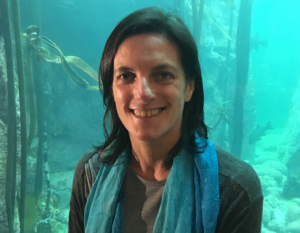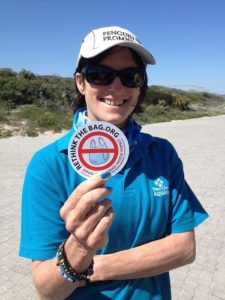GREEN HOME Interviews: Hayley McLellan – Advocating a Plastic Bag Free South Africa
Last week, Hayley McLellan took time out of her busy schedule to meet up with GREEN HOME’s Environmental Research Ambassador, Cassandra Gamble, to chat about oceans, plastic shopping bags and activism.
Hayley is the Environmental Campaigner for the Two Oceans Aquarium and creator of the Rethink the Bag Campaign. She is 100% determined to see a ban on plastic shopping bags in South Africa.

“I was a Lone Voice in the Wilderness”
Hayley’s experiences in the early days of campaigning for a plastic shopping bag-free South Africa are reminiscent of those of GREEN HOME’s founder, Catherine Morris. In fact, Hayley quit plastic shopping bags the same year that Catherine started GREEN HOME: 2007.
She describes feeling like a lone voice in the wilderness. Back then the plastic pollution crisis had yet to hit mainstream news and words like ‘microplastic’ and ‘biodegradable’ and ‘compostable’ were barely known. People didn’t understand the need to ban plastic bags, or choose compostable products.
Sea Change
Not so anymore. Today Hayley feels strongly supported in her cause. People are waking up and her excitement is palpable. She strongly believes the tipping point – where plastic bags are finally banned in South Africa – is coming soon.
She points out that many African countries have already banned plastic bags, and that our government is under increased pressure to act. Tourism, waste management, health and conservation are all sectors that will benefit.
And, of course, wildlife and oceans will be safer. Hayley says that the true environmental costs of plastic bags are not taken into account when measuring their impacts, with life cycle analyses and reports focusing on production and transport. But what happens after use? How do you measure and quantify sea mammals and birds eating or getting trapped in plastic bags?
“We Won’t Recycle our way out of this Mess”
Recently, the large supermarket chains have all scrambled to make sure their plastic bags are recyclable. And many consumers are taking this as enough of a reason to keep using them.
But Hayley is still urging consumers to just say NO to single-use bags, whether they’re recyclable or not. “We won’t recycle our way out of this mess.” she says. Lots of bags still make their way into the environment. They’re still not biodegradable. And every time plastic is recycled its quality decreases. So of the few bags that are recycled, often lower-grade products are made which are destined to become waste themselves.
Hayley also really wants consumers to enjoy the feeling of empowerment that comes with living plastic bag free. She calls it an added bonus – the great way we feel when we exercise our conscious choice as consumers. Instead of feeling inconvenienced, she notes that refusing plastic bags is liberating and empowering.
In closing she asks, “How do you eat an elephant?”
Answer: “One bite at a time.”
“And how do we create a plastic bag free South Africa?”
“One person at a time.”

3 July 2019 is International Plastic Bag Free Day. But why wait when you can start right now? Join the campaign and start enjoying a life free of plastic bags today.

